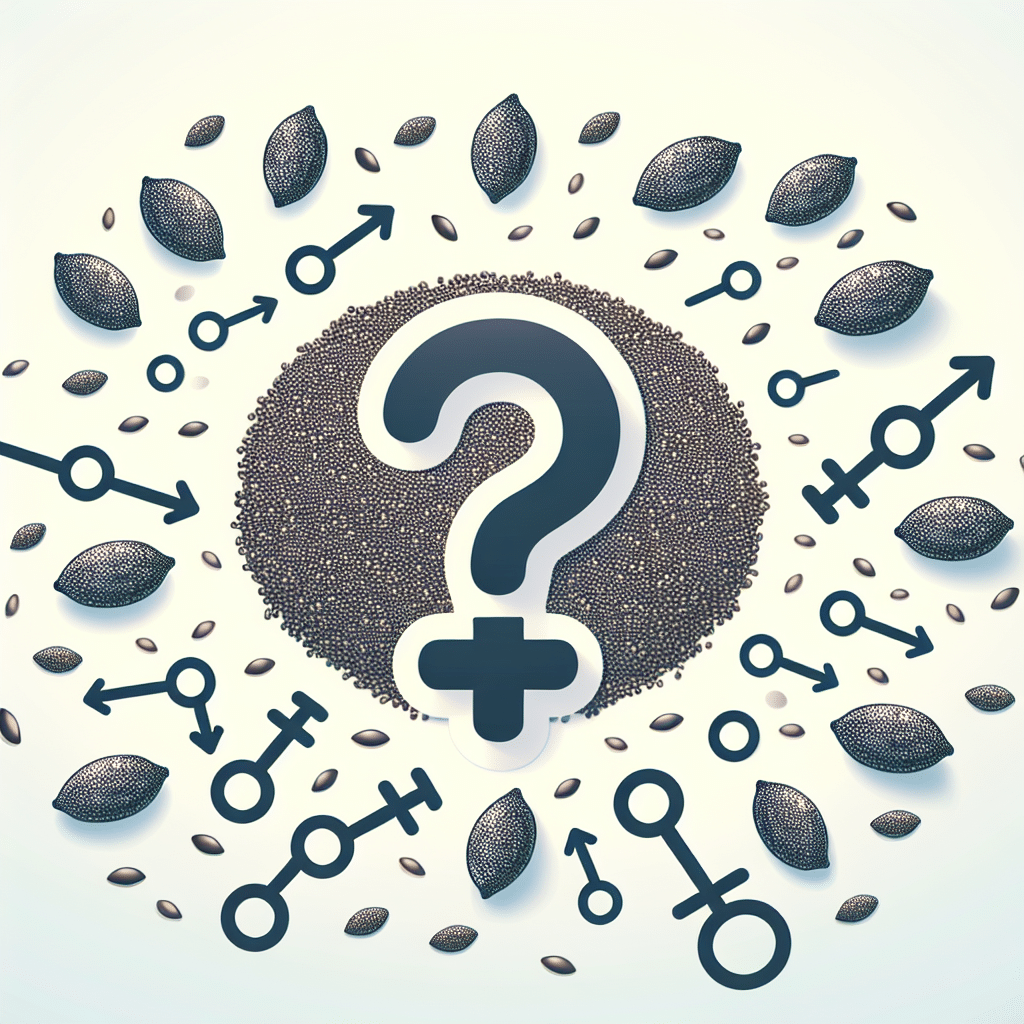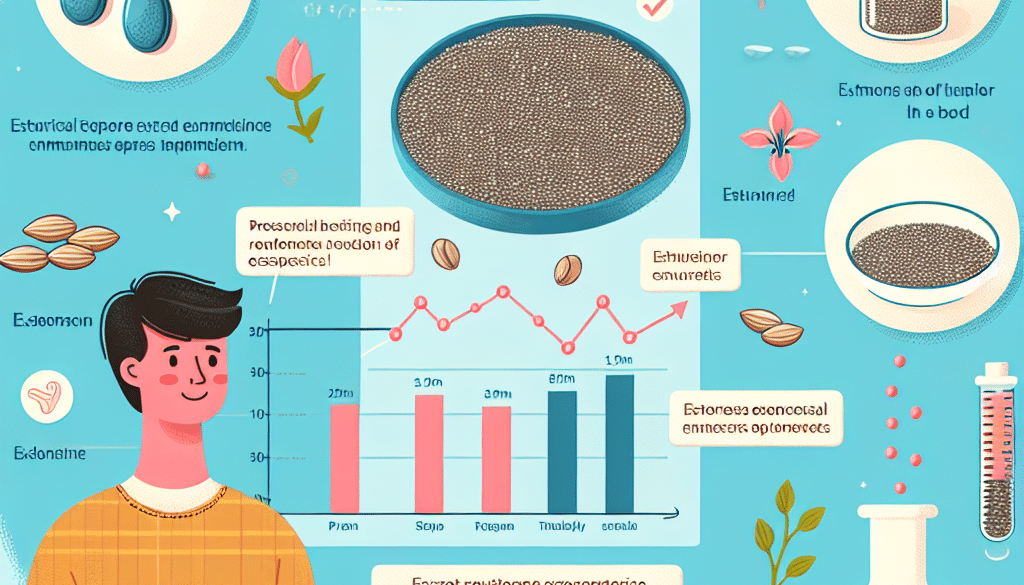Does Chia Seeds Lower Estrogen?
-
Table of Contents
- Chia Seeds and Estrogen Levels: Unveiling the Connection
- Understanding Estrogen and Its Role in the Body
- Nutritional Profile of Chia Seeds
- Do Chia Seeds Lower Estrogen?
- Impact of Fiber on Estrogen
- Omega-3 Fatty Acids and Hormonal Balance
- Phytoestrogens: A Double-Edged Sword?
- Research Findings and Case Studies
- Considerations and Recommendations
- Conclusion: The Verdict on Chia Seeds and Estrogen
- Discover ETprotein’s Premium Protein Products
Chia Seeds and Estrogen Levels: Unveiling the Connection

Chia seeds, the tiny black seeds from the plant Salvia hispanica, have gained immense popularity as a superfood in recent years. Known for their rich nutritional profile, these seeds are packed with fiber, omega-3 fatty acids, proteins, and various micronutrients. However, their potential impact on hormone levels, particularly estrogen, has sparked interest and debate among health enthusiasts and researchers alike. This article delves into the scientific evidence to explore whether chia seeds can indeed lower estrogen levels in the body.
Understanding Estrogen and Its Role in the Body
Before examining the effects of chia seeds on estrogen, it’s crucial to understand what estrogen is and its significance. Estrogen is a primary female sex hormone, although it is also present in men in smaller amounts. It plays a vital role in the development of female sexual characteristics and the reproductive system. In addition, estrogen influences bone health, cholesterol metabolism, and mood regulation.
Estrogen levels can fluctuate due to various factors such as age, menstrual cycle, pregnancy, and certain health conditions. An imbalance in estrogen levels can lead to issues like menstrual irregularities, menopausal symptoms, and in some cases, hormonal-related cancers.
Nutritional Profile of Chia Seeds
Chia seeds are a nutritional powerhouse, and their composition may offer clues to their potential hormonal effects:
- Fiber: Chia seeds are an excellent source of dietary fiber, which is known to support digestive health and may play a role in hormone regulation.
- Omega-3 Fatty Acids: These seeds are rich in alpha-linolenic acid (ALA), a type of omega-3 fatty acid that has been associated with various health benefits, including potential hormonal effects.
- Protein: Chia seeds contain a significant amount of protein, which is essential for numerous bodily functions, including hormone production.
- Phytoestrogens: They also contain compounds known as phytoestrogens, which are plant-derived xenoestrogens that can mimic or modulate the body’s own estrogen.
Do Chia Seeds Lower Estrogen?
The question of whether chia seeds can lower estrogen levels is complex and requires a look at the available scientific evidence. Here’s what research suggests:
Impact of Fiber on Estrogen
One of the ways chia seeds could potentially influence estrogen levels is through their high fiber content. Dietary fiber has been shown to bind to estrogen in the digestive tract, which can then be excreted from the body. This process may lower circulating estrogen levels. However, the extent to which chia seeds can significantly impact this process is not fully understood and may vary from person to person.
Omega-3 Fatty Acids and Hormonal Balance
The omega-3 fatty acids in chia seeds may also play a role in hormonal balance. Some studies suggest that omega-3s can have a modulating effect on hormone production, including estrogen. However, the research is not conclusive, and the mechanisms behind these effects are still being explored.
Phytoestrogens: A Double-Edged Sword?
Phytoestrogens in chia seeds can bind to estrogen receptors in the body, potentially exerting weak estrogenic or anti-estrogenic effects. The impact of phytoestrogens on estrogen levels can be complex, as they may either mimic the action of estrogen or block its effects, depending on the individual’s hormonal status and the concentration of phytoestrogens consumed.
Research Findings and Case Studies
While there is a growing body of research on the health benefits of chia seeds, studies specifically investigating their effect on estrogen levels are limited. Some animal studies have suggested that chia seeds may have the potential to modulate estrogen levels, but human studies are needed to confirm these findings.
Case studies involving individuals with hormonal imbalances who have incorporated chia seeds into their diets have reported mixed results. Some have experienced improvements in hormonal symptoms, while others have not noticed significant changes.
Considerations and Recommendations
For those considering adding chia seeds to their diet for hormonal health, it’s important to keep the following in mind:
- Consult with a healthcare provider before making significant changes to your diet, especially if you have a hormonal imbalance or are taking hormone-related medications.
- Chia seeds can be part of a balanced diet but should not be relied upon as a sole treatment for hormonal issues.
- Individual responses to dietary changes can vary greatly, so it’s important to monitor your body’s reactions and adjust your intake accordingly.
Conclusion: The Verdict on Chia Seeds and Estrogen
In conclusion, while chia seeds contain components that could theoretically influence estrogen levels, such as fiber, omega-3 fatty acids, and phytoestrogens, the current scientific evidence is insufficient to make definitive claims. More research is needed to understand the potential hormonal effects of chia seeds fully. For those interested in trying chia seeds for their possible hormonal benefits, it’s advisable to do so as part of a comprehensive approach to health and in consultation with a healthcare professional.
Discover ETprotein’s Premium Protein Products
If you’re looking to enhance your diet with high-quality protein sources, consider exploring ETprotein’s range of organic bulk vegan proteins. Their products, including organic rice protein, pea protein, and various seed proteins, are characterized by a neutral taste, non-GMO, and allergen-free attributes. With L-(+)-Ergothioneine purity over 98%, ETprotein caters to a diverse range of industries and dietary needs. Whether you’re seeking to support your hormonal health, improve your fitness regimen, or simply enrich your diet with plant-based proteins, ETprotein offers comprehensive solutions to meet all your protein requirements.
About ETprotein:
ETprotein, a reputable protein and L-(+)-Ergothioneine (EGT) Chinese factory manufacturer and supplier, is renowned for producing, stocking, exporting, and delivering the highest quality organic bulk vegan proteins and L-(+)-Ergothioneine. They include Organic rice protein, clear rice protein, pea protein, clear pea protein, watermelon seed protein, pumpkin seed protein, sunflower seed protein, mung bean protein, peanut protein, and L-(+)-Ergothioneine EGT Pharmaceutical grade, L-(+)-Ergothioneine EGT food grade, L-(+)-Ergothioneine EGT cosmetic grade, L-(+)-Ergothioneine EGT reference grade and L-(+)-Ergothioneine EGT standard. Their offerings, characterized by a neutral taste, non-GMO, allergen-free attributes, with L-(+)-Ergothioneine purity over 98%, 99%, cater to a diverse range of industries. They serve nutraceutical, pharmaceutical, cosmeceutical, veterinary, as well as food and beverage finished product distributors, traders, and manufacturers across Europe, USA, Canada, Australia, Thailand, Japan, Korea, Brazil, and Chile, among others.
ETprotein specialization includes exporting and delivering tailor-made protein powder and finished nutritional supplements. Their extensive product range covers sectors like Food and Beverage, Sports Nutrition, Weight Management, Dietary Supplements, Health and Wellness Products, and Infant Formula, ensuring comprehensive solutions to meet all your protein needs.
As a trusted company by leading global food and beverage brands and Fortune 500 companies, ETprotein reinforces China’s reputation in the global arena. For more information or to sample their products, please contact them and email sales(at)ETprotein.com today.














